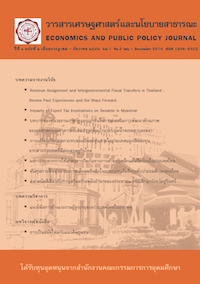Revenue Assignment and Intergovernmental Fiscal Transfers in Thailand : Review Past Experiences and the Ways Forward
Main Article Content
บทคัดย่อ
This paper reviews Thailand’s system of local governance finance and decentralization with emphasis on two specific issues; viz., revenue assignment and grant allocation to support local governance. Over the past decade the grant revenue increased to support local governments’ supply of local public goods. This have led to too a high-dependency on annual budgetary grant which is not a good sign – if this trend will continued, then local autonomy will be weakened and may lead to inefficient local budget management. In this connection, the author proposes for a fiscal reform: a) it is important to broaden local tax base and this can be achieved by introduction of property and environmental taxation; b) the tax-sharing rules between central and local governments should be amended, specifically 70:30 formula may be appropriate and the sharing tax base should include VAT, excise taxes, personal and corporate income taxes, and natural resource taxes. Thirdly, the new design of grant amount and allocation formula proposed.
Article Details
ประเภทบทความ
บทความวิจัย
สงวนลิขสิทธิ์ © 2553 คณะเศรษฐศาสตร์ มหาวิทยาลัยศรีนครินทรวิโรฒ
คณะเศรษฐศาสตร์ มหาวิทยาลัยศรีนครินทรวิโรฒ จัดพิมพ์วารสารเศรษฐศาสตร์และนโยบายสาธารณะ เพื่อเผยแพร่บทความวิชาการทางเศรษฐศาสตร์ นโยบายสารธารณะ และสาขาอื่นๆที่เกี่ยวข้อง ทัศนะและข้อคิดเห็นใดๆ ที่ปรากฏในวารสารเป็นความคิดเห็นส่วนตัวของผู้เขียน โดยบทความที่ได้รับการตอบรับจะถือเป็นลิขสิทธิ์ของคณะเศรษฐศาสตร์ มหาวิทยาลัยศรีนครินทรวิโรฒ
บรรณาธิการ อาจารย์ ดร.พลพัธน์ โคตรจรัส


